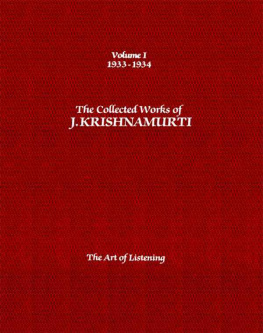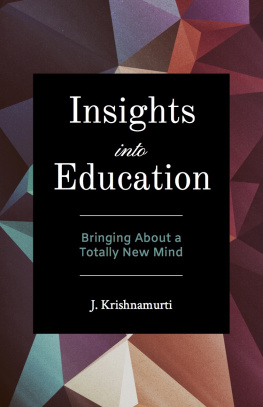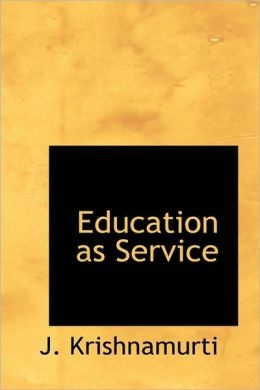Krishnamurti - Unconditioning and Education, Volume 1
Here you can read online Krishnamurti - Unconditioning and Education, Volume 1 full text of the book (entire story) in english for free. Download pdf and epub, get meaning, cover and reviews about this ebook. publisher: Krishnamurti Foundation of America, genre: Religion. Description of the work, (preface) as well as reviews are available. Best literature library LitArk.com created for fans of good reading and offers a wide selection of genres:
Romance novel
Science fiction
Adventure
Detective
Science
History
Home and family
Prose
Art
Politics
Computer
Non-fiction
Religion
Business
Children
Humor
Choose a favorite category and find really read worthwhile books. Enjoy immersion in the world of imagination, feel the emotions of the characters or learn something new for yourself, make an fascinating discovery.

- Book:Unconditioning and Education, Volume 1
- Author:
- Publisher:Krishnamurti Foundation of America
- Genre:
- Rating:3 / 5
- Favourites:Add to favourites
- Your mark:
- 60
- 1
- 2
- 3
- 4
- 5
Unconditioning and Education, Volume 1: summary, description and annotation
We offer to read an annotation, description, summary or preface (depends on what the author of the book "Unconditioning and Education, Volume 1" wrote himself). If you haven't found the necessary information about the book — write in the comments, we will try to find it.
Unconditioning and Education, Volume 1 — read online for free the complete book (whole text) full work
Below is the text of the book, divided by pages. System saving the place of the last page read, allows you to conveniently read the book "Unconditioning and Education, Volume 1" online for free, without having to search again every time where you left off. Put a bookmark, and you can go to the page where you finished reading at any time.
Font size:
Interval:
Bookmark:
Unconditioning and Education, Volume 1
Copyright 2015 Krishnamurti Foundation Trust Ltd
Edited by Ray McCoy and Duncan Toms

From ancient days, man has sought something beyond the materialistic world, something immeasurable, something sacred. It is the intent of this school to inquire into this possibility.
This whole movement of inquiry into knowledge, into oneself, into the possibility of something beyond knowledge, brings about naturally a psychological revolution, and from this comes, inevitably, a totally different order in human relationships, which is society. The intelligent understanding of all this can bring about a profound change in the consciousness of mankind.
J. Krishnamurti,
The Intent of the Oak Grove School
CONTENT S
FOREWOR D
In the lifetime of J. Krishnamurti, the last school that began with his help was in the town of Ojai in California. He had first spent time there in 1922 and, after 1933, stayed the longest continuous periods of his life in the valley. Since the early 1930s, large numbers of people had attended his public talks in the town; families moved there because of their interest in what he said. It was in Ojai that he wrote his first major book, Education and the Significance of Life, published in 1953. The possibility of starting a school in his name had been mentioned from time to time after 1953, but there was no concerted movement for it until friends who had formed the Krishnamurti Foundation of America began serious discussions with him about his views on right education.
In 1970, in one of his recorded conversations with himself, Krishnamurti asked:
Could not the intelligent minority of parents get together and start a school in which the whole of man is considered and cared for, in which the educator is not merely the informant, a machine which imparts knowledge, but is concerned with the well-being of the whole human being? ... It means creating a place where the educator is being educated, and the help of a few parents who are deeply interested. (From Beginnings of Learning, first published by Victor Gollancz Ltd in 1975.)
It may have been with this in mind that Krishnamurti agreed to meet with some trustees of KFA and other friends, first in Malibu in 1974, and continuing with parents, trustees and prospective teachers in Ojai in 1975, to discuss starting a school. The two volumes of Unconditioning and Education present these remarkable dialogues, which led to the opening of Oak Grove School in 1976.
Krishnamurti begins the discussions by explaining that traditional education prepares children to conform to society, to memorize facts in order to acquire knowledge. He says that this limits the mind by narrowing its function and limiting its creativity. The educators and the children are conditioned to traditional patterns of inquiry, neglecting exploration of broader development as whole human beings psychologically, spiritually, intellectually and morally. He would have the educators explore the possibility of bringing about a different kind of mind.
Krishnamurti asks the bold question: Is there a method to uncondition the human mind? He suggests that the conditioning of tradition and society can be uncovered and dissolved. He wants the parents to be involved in this, to understand the intention that, in talking with their children, walking with them, living with them, the parents, the teachers and the children will establish a relationship in which there is no authority, but a sense of freedom to explore and to grow inwardly. Then when the children leave the school they will have good minds that are intelligent, can meet any challenge and understand what it means to be religious.
Krishnamurtis great vision of true education is expressed in his statement about the intent of Oak Grove School:
The whole movement of inquiry into knowledge, into oneself, into the possibility of something beyond knowledge, brings about naturally a psychological revolution, and from this comes, inevitably, a totally different order in human relationships, which is society. The intelligent understanding of all this can bring about a profound change in the consciousness of mankind.
The Editors
INTRODUCTIO N
Why are we being educated at all?
J. Krishnamurti interviewed by Fred Hall
Mr Fred Hall (FH): Mr Krishnamurti, you are now working toward the realization of a new school in the Ojai Valley, an educational centre. We have, I think, four or five private schools and an abundance of public schools here. Now, Im wondering why another school.
Krishnamurti (K): You are asking what the difference is between this school and other schools.
FH: Certainly.
K: Sir, first of all, why are we being educated at all? When we are educated, in public schools, private schools, universities and colleges and so on, either we condition the mind or we give emphasis to a particular segment of the brain, which is the cultivation of memory and the skill in action of that memory. That is what is generally considered education in the modern world, both in Europe and in America. And it is going on in India. All that is a fragmentary kind of education. What we are trying to do is to educate the whole of man.
FH: Will you be starting with a very young child in elementary school?
K: Yes, from the age of 8 to 18.
FH: Would you require any particular background for this youngster?
K: No, no. Naturally, we do not want them to be drug addicts, (Laughs) and when childrens parents are divorced, it makes it awfully difficult.
FH: You do not want a disturbed child.
K: We can have one or two, but not a whole group of them.
FH: Are you talking of a residential school?
K: Residential as well as partly non-residential.
FH: And you would offer a basic education of the kind that is required.
K: Of course, first class academically, as we do in England and India.
FH: Well now, just in reading some notes about the school, you refer to it as a place where one can learn a way of living that is whole, sane, and holy. Would you mind taking those three things, whole, sane, and holy, and explaining to me what you mean?
K: You see, the word whole, if you look in a good dictionary, means healthy, physically healthy. That means, non-drug, non-alcohol, non-smoking and keeping the body perfectly healthy. The right nutrition, good food, all that is implied. Then, sane; that word sanity means a mind that is not crippled by belief, a mind that is not conditioned by propaganda, that is capable of thinking clearly, freely, not bound to any particular tradition.
FH: Are any of us at 8 years of age, for example, in that position?
K: Of course not, poor chaps! No, of course not, but as they progress, as they grow older, we are going to work to have a right relationship between the teacher and the student, so that in discussing with them, both the teacher and the student uncondition themselves. That is the whole problem of education.
And whole means, also, holy: to treat life as something sacred. After all, man is not just an animal and not just a technological entity. We want to respect nature. We want to respect other human beings, not become violent, not become brutal, selfish. All that is implied in that word holy, and much more.
FH: Do you see a tendency today in school systems throughout the world to dwell on material things primarily, how to function in society?
K: Oh, obviously. Because everybody is concerned with how to get money, get a job, get a positionin India as well.
Next pageFont size:
Interval:
Bookmark:
Similar books «Unconditioning and Education, Volume 1»
Look at similar books to Unconditioning and Education, Volume 1. We have selected literature similar in name and meaning in the hope of providing readers with more options to find new, interesting, not yet read works.
Discussion, reviews of the book Unconditioning and Education, Volume 1 and just readers' own opinions. Leave your comments, write what you think about the work, its meaning or the main characters. Specify what exactly you liked and what you didn't like, and why you think so.










